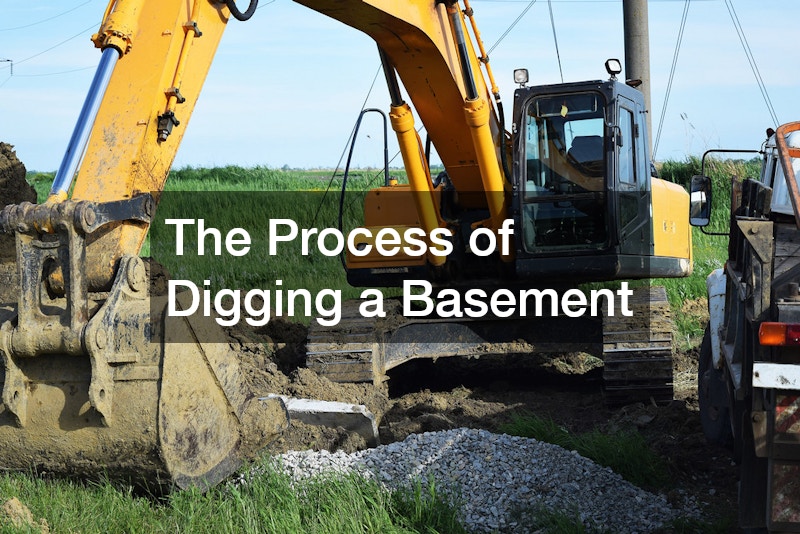Excavation is a crucial first step in the journey of constructing a basement. Trained professionals meticulously converge engineering and artistry to ensure stability and durability in the structures they create. Before even breaking ground, excavation experts must consider various factors, including soil type, weather conditions, and the building design itself.
These professionals conduct comprehensive surveys and soil analyses to determine the most effective excavation techniques. Ensuring that no detail is overlooked is paramount to creating a basement that stands the test of time and resists the pressures imposed by the surrounding earth and environmental factors.
Once the plan is set, excavation begins with site clearing. This involves the removal of any vegetation, rocks, and debris that could hinder the digging process. Heavy machinery, such as bulldozers and backhoes, is employed to speed up this initial phase. Additionally, strict adherence to safety protocols is maintained to ensure both the workers’ and the site’s safety. The clearance phase not only prepares the site for the next steps but also acts as a clear demarcation for the area to be excavated.
The next step involves digging the trenches that outline the basement’s walls and foundation. Excavation professionals use advanced technology to ensure these trenches are accurately placed and dug to precise depths, creating a formwork for the future structure. This phase is crucial as inaccuracies can result in significant structural weaknesses later. The skill and knowledge of the excavation experts are critical here, as they determine the optimal angle and depth for these trenches based on comprehensive geological data. By adhering to these meticulous steps, excavation professionals safeguard the building’s longevity and integrity.
The Process of Digging a Basement

The actual digging of the basement is an intricate process that requires careful planning and execution. Excavation crews typically begin by marking out the area to be excavated using stakes and strings, giving them a visual roadmap. After the markings are confirmed, the excavation machinery springs into action, carefully removing layers of earth to reach the required depth. The earth removal process is monitored closely to maintain precision, given how critical it is to the formation of a solid base for the basement. The type of soil, ranging from clay to sandy loam, often dictates the equipment and techniques used, showcasing the versatility and adaptability of excavation specialists.
As the excavation process unfolds, it’s not uncommon to encounter unforeseen challenges such as underground water or rocks. Excavation experts are trained to address these issues efficiently, employing pumps to remove water or using rock-breaking equipment to ensure a smooth digging process. These obstacles only underscore the importance of having seasoned professionals on the job, as their experience is invaluable in maintaining progress without compromise. Additionally, constant communication with engineers and construction managers ensures that any adjustments conform to the overall architectural and safety plans. The intricate dance between overcoming barriers and adhering to design specifications exemplifies the expertise required in excavation.
Once the desired depth is achieved, the next step involves reinforcing the excavation site to prevent cave-ins and ensure safety. This often involves shoring up the walls using wooden or metal reinforcements, depending on the site’s particular needs and the surrounding environment. During this phase, excavation professionals also conduct thorough quality checks to ensure that every aspect meets the necessary standards for a durable foundation. Coordination with other construction teams is essential to synchronize the pouring of concrete and other foundational materials flawlessly.
Ensuring Quality and Safety in Excavation Projects
Safety is a paramount concern throughout the entire excavation process, and experienced contractors prioritize it above all else. Thorough risk assessments are conducted to identify potential hazards, which are then mitigated through strategic planning and the use of appropriate safety equipment. Personnel are trained extensively, not just in operating machinery but also in best practices for emergency situations. This rigorous approach to safety ensures not only the well-being of workers but also the integrity of the excavation site. By maintaining a secure working environment, professionals can focus more effectively on delivering quality outcomes.
Another key aspect of quality in excavation is adhering to timeframes and budget constraints without compromising on the project’s safety or integrity. Expert excavators understand the importance of coordinating with suppliers, engineers, and other stakeholders to ensure that the project remains on track. Beyond mere coordination, adaptability plays a critical role, as unexpected challenges like adverse weather conditions or supply chain disruptions can occur. By employing strategic problem-solving skills, excavation experts effectively navigate these conditions to keep the project moving forward. These experts ensure that construction doesn’t just begin on a solid foundation but also progresses smoothly toward completion.
The completion of excavation marks the transition from a mere piece of land to the foundation of a potential future home or building. Excavation professionals leave behind a site that is ready for the next phases of construction, having ensured that each aspect of the groundwork adheres to stringent standards. Their expertise results in a basement that not only supports the structure above but also provides an additional usable space that maximizes the property’s potential. Whether it’s for residential or commercial purposes, a well-executed excavation project is crucial for ensuring long-term stability and satisfaction for both builders and future occupants. By emphasizing quality and safety, excavation experts lay a foundation for success in the literal and figurative sense.
